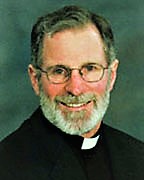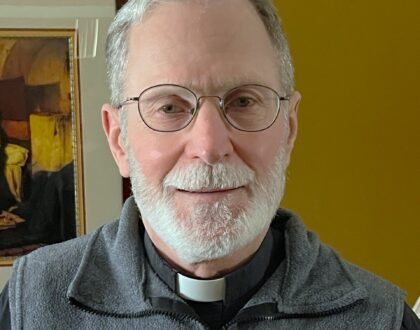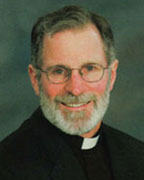Homily, June 30, 2024

From The Pastor
Gratitude is the heart of Christian prayer. Any believer in the awareness of the love of Christ in the gift of redemption will pray from a foundation of gratitude. Gratitude is realized through bonds of love that inspire the desire to give thanks. More than a simple thank you of appreciation, gratitude grows from a deeper place of inner goodness in the heart that comes from the soul. Gratitude is a response to the bonds of love that are given in countless expressions of unsolicited generosity without attachment or expected return.
God is the source and origin of this kind of love. God is the only source of love. Any love shared that inspires gratitude has its origin in God. The kind of love that inspires gratitude is love that builds faith and trust in God that reveals itself through human encounters. This kind of gratitude makes life beautiful as it opens a path to God with a trust in Christ that reveals the Holy Spirit.
This kind of spiritual awareness was common in the first century of the Church. Faith was commonly realized in the awareness of God through the love of Christ and his life saving Cross. Early on, faith was more heart centered. As the Church grew institutionally and a catechetical structure came to the fore, faith became more head centered. It became more a learning in the head than a formation of the heart. Jesus, and the life he lived, made it clear the heart was the spiritual center and core of the person. Head learning created an image of God that tended to cause fear, doubt, and rule-based obedience. Heart based faith awakens the awareness of love and gratitude. God is known and loved through personal encounters of love, rather than rules of right behavior that earn grace points.
Today’s first reading is a beautiful expression that can stretch and awaken a new image of God and the meaning of grace in human life. It is a work of the heart. Sit with the words and listen to their meaning. ‘God did not create death and does not rejoice in the destruction of the living.’ If you feel God is a mean sin counter ready to punish every human wrongdoing, sit quietly with these words. You belong to God more than parent to child.
We often hear in the words from St. Paul that we are temples of the Holy Spirit, a dwelling place of God, that we are holy and beloved of God. These words could not be truer. If you struggle to believe this, or you doubt your self-worth, or question your value to God, consider these words: ‘God formed man (human beings) to be imperishable, in the image of his own nature he made him.’ God created you and each of us in the image of his own liking, sowing in each of us the essence of his own nature.
God cannot deny the image of his own making despite the lie of evil and the frustration of sin that distorts the human condition. Why sin and death? Why the need for redemption? Because ‘By the envy of the devil, death entered the world, and those who belong to his company experience it.’ Sin hides gratitude in the fear of punishment that teaches distrust of God. This is the lie of perfection that the devil preaches, as if to say God is perfect and you cannot be perfect, so you have no place in God. The wiles of deception lead us to believe this. Love becomes obscured in the disruption of sin.
The power of God in Jesus proves otherwise. Jesus will not allow himself to be bound by the rubrics of religion or culture. The woman burdened with hemorrhaging was ritually unclean. That did not stop Jesus from touching her and showing deep compassion. He attends not only to her illness, but more importantly to her as a person exhausted and in pain. He sees faith in her and desires for her to realize her own goodness and beauty. It was her faith, her desire to trust God that brought her healing.
The synagogue official is clearly a man of love in concern for his daughter. Faith is evident and trust is strong. Other details are of little consequence. Even the news of her death leaves Jesus unfazed. God-Love has power over death. Jesus is Divine Love in action. He simply gives the command,” Talitha, koum,” meaning, “Little girl arise!” Jesus performs an act of creation in giving new life through the power of love.
God’s love lives in all of us. Faith gives it identity and expression. Death is natural to the body, but not to the soul. The soul is made to be imperishable, coming from God and returning to God. God’s justice, which is mercy, which is love, is undying.
In a spirit of gratitude, ponder your faith this week. Despite all the trials of human existence, life is still beautiful. We are not meant for death, but imperishable in the image of God’s making. In the end, only love will remain. Praise God for the gift of your life.
Father John Esper
Recent Sermons

Homily, March 30, 2025
March 27, 2025

Homily, March 23, 2025
March 20, 2025

Homily, March 16, 2025
March 11, 2025

